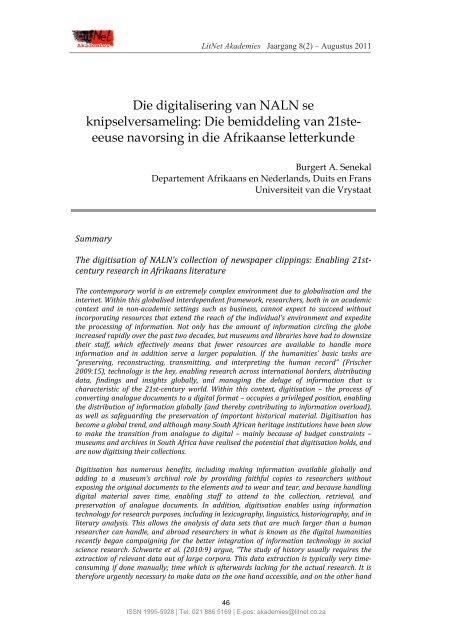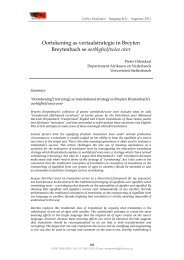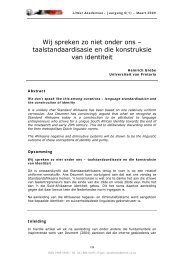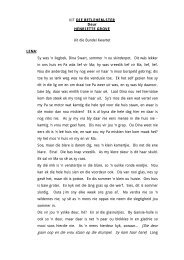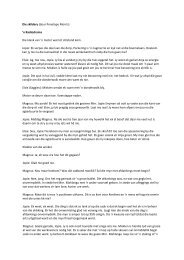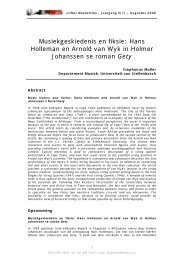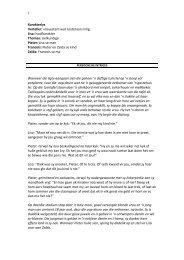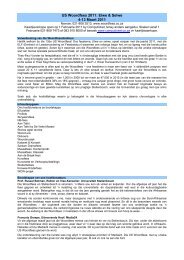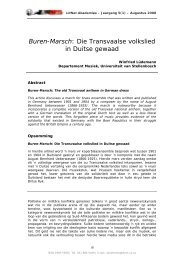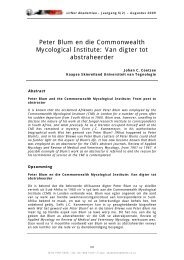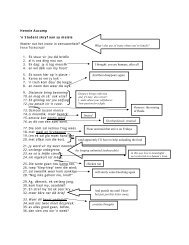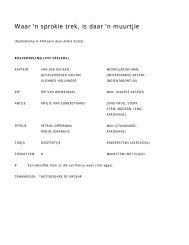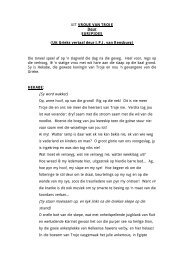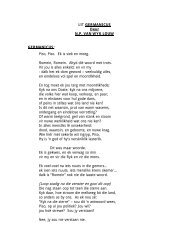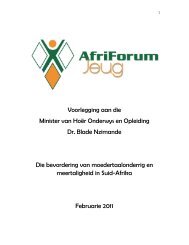Jaargang 8, nommer 2 – Augustus 2011 - LitNet
Jaargang 8, nommer 2 – Augustus 2011 - LitNet
Jaargang 8, nommer 2 – Augustus 2011 - LitNet
Create successful ePaper yourself
Turn your PDF publications into a flip-book with our unique Google optimized e-Paper software.
<strong>LitNet</strong> Akademies <strong>Jaargang</strong> 8(2) <strong>–</strong> <strong>Augustus</strong> <strong>2011</strong><br />
Die digitalisering van NALN se<br />
knipselversameling: Die bemiddeling van 21steeeuse<br />
navorsing in die Afrikaanse letterkunde<br />
Summary<br />
Burgert A. Senekal<br />
Departement Afrikaans en Nederlands, Duits en Frans<br />
Universiteit van die Vrystaat<br />
The digitisation of NALN’s collection of newspaper clippings: Enabling 21stcentury<br />
research in Afrikaans literature<br />
The contemporary world is an extremely complex environment due to globalisation and the<br />
internet. Within this globalised interdependent framework, researchers, both in an academic<br />
context and in nonacademic settings such as business, cannot expect to succeed without<br />
incorporating resources that extend the reach of the individual's environment and expedite<br />
the processing of information. Not only has the amount of information circling the globe<br />
increased rapidly over the past two decades, but museums and libraries have had to downsize<br />
their staff, which effectively means that fewer resources are available to handle more<br />
information and in addition serve a larger population. If the humanities’ basic tasks are<br />
“preserving, reconstructing, transmitting, and interpreting the human record” (Frischer<br />
2009:15), technology is the key, enabling research across international borders, distributing<br />
data, findings and insights globally, and managing the deluge of information that is<br />
characteristic of the 21stcentury world. Within this context, digitisation <strong>–</strong> the process of<br />
converting analogue documents to a digital format <strong>–</strong> occupies a privileged position, enabling<br />
the distribution of information globally (and thereby contributing to information overload),<br />
as well as safeguarding the preservation of important historical material. Digitisation has<br />
become a global trend, and although many South African heritage institutions have been slow<br />
to make the transition from analogue to digital <strong>–</strong> mainly because of budget constraints <strong>–</strong><br />
museums and archives in South Africa have realised the potential that digitisation holds, and<br />
are now digitising their collections.<br />
Digitisation has numerous benefits, including making information available globally and<br />
adding to a museum’s archival role by providing faithful copies to researchers without<br />
exposing the original documents to the elements and to wear and tear, and because handling<br />
digital material saves time, enabling staff to attend to the collection, retrieval, and<br />
preservation of analogue documents. In addition, digitisation enables using information<br />
technology for research purposes, including in lexicography, linguistics, historiography, and in<br />
literary analysis. This allows the analysis of data sets that are much larger than a human<br />
researcher can handle, and abroad researchers in what is known as the digital humanities<br />
recently began campaigning for the better integration of information technology in social<br />
science research. Schwarte et al. (2010:9) argue, “The study of history usually requires the<br />
extraction of relevant data out of large corpora. This data extraction is typically very timeconsuming<br />
if done manually; time which is afterwards lacking for the actual research. It is<br />
therefore urgently necessary to make data on the one hand accessible, and on the other hand<br />
46<br />
ISSN 1995-5928 | Tel: 021 886 5169 | E-pos: akademies@litnet.co.za


